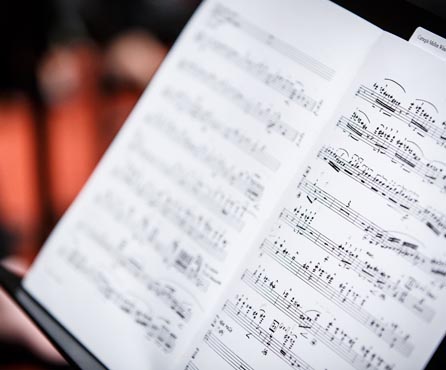PITTSBURGH— Three academic units of Carnegie Mellon University are collaborating to offer two new degrees in Music and Technology to train the next generation of composers, engineers and programmers in music signal processing, sound production, composition and the cognition of music.
Based in the School of Music, the Bachelor of Science in Music and Technology and the Master of Science in Music and Technology programs bring together faculty from the Carnegie Institute of Technology, the School of Computer Science and the School of Music to explore new ways of performing, creating, presenting and archiving music. Carnegie Mellon will usher in the first undergraduate and graduate classes in fall 2009.
Noel Zahler, head of the School of Music, worked with Roger Dannenberg, associate professor of computer science; Richard Stern, professor of electrical engineering; Riccardo Schulz, associate teaching professor/recording engineer; and Thomas Sullivan, lecturer in electrical and computer engineering, to develop both the bachelor’s and master’s degree programs.
“This convergence of disciplines creates exciting opportunities for forward-thinking artists, scientists and engineers who are interested in combining their talents,” Zahler said. “The program combines the innovation of the Carnegie Mellon experience with the world-class music making of this school to produce new and compelling musical experiences.”
As this field of study crosses several curricula, a team of advisors will assist students in planning courses to help them reach their professional goals. Students will develop an understanding of music, computer science and electrical engineering, with an emphasis on one of these concentrations. Courses such as sound production, music signal processing and recording will be interspersed with core music courses, including music history, solfege and harmony. Both degree programs will culminate in a research-based capstone project.
Carnegie Mellon’s School of Music educates outstanding, intellectually gifted musicians through excellence in performance, creativity, scholarship and pedagogy. The School of Music offers undergraduate degrees in music composition, music and technology, and instrumental, vocal and keyboard performance. Graduate degrees are offered in composition, conducting and performance, music and technology and music education. The school also offers a variety of highly acclaimed non-degree programs, such as the Performance Residency Program, the Artist Diploma Program and the Dalcroze Eurhythmics, Piano Pedagogy, Advanced Flute Studies, Orff Schulwerk and Music Education certificate programs.
The School of Computer Science, one of the world’s premier institutions for computer science research and education, supports a number of multidisciplinary programs that unite technology with the arts. Notably, the university’s Entertainment Technology Center, which explores the new realm of digital entertainment, is operated jointly by the School of Computer Science and the College of Fine Arts.
The Carnegie Institute of Technology is one of the foremost engineering colleges in the world. It emphasizes interdisciplinary research and partnerships with industry and produces graduates who are able to transfer their fundamental engineering knowledge into industrial practice.
